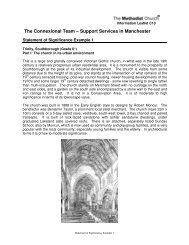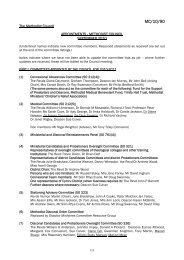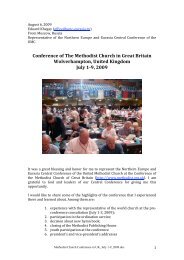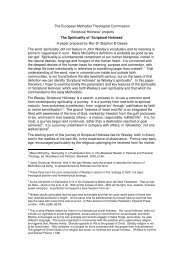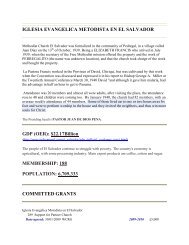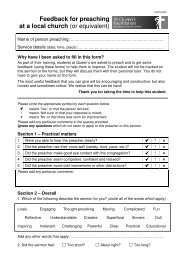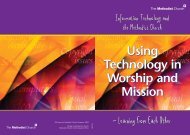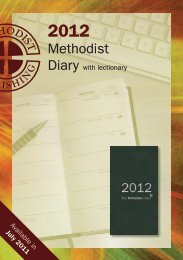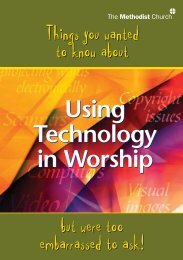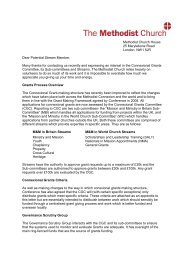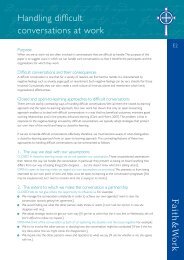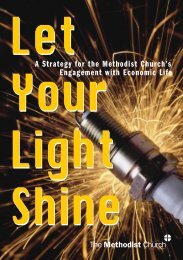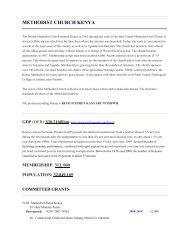Discipleship and the people called Methodists - BEH District
Discipleship and the people called Methodists - BEH District
Discipleship and the people called Methodists - BEH District
You also want an ePaper? Increase the reach of your titles
YUMPU automatically turns print PDFs into web optimized ePapers that Google loves.
Journaling<br />
Keeping a journal of your spiritual progress is growing in popularity today. It’s not<br />
a new idea. Many great Christian disciples down <strong>the</strong> ages kept a journal. Nor is<br />
<strong>the</strong> idea alien to <strong>Methodists</strong>. Far from it, as <strong>the</strong> voluminous journaling of John<br />
<strong>and</strong> Charles Wesley demonstrates. Some think it prone to introspection <strong>and</strong> self-<br />
centredness, <strong>and</strong> <strong>the</strong>re is always <strong>the</strong> possibility of that happening. But it’s worth<br />
taking a chance <strong>and</strong> beginning (or recommitting yourself) to spiritual journaling. It<br />
aids prayer – many <strong>people</strong> keep notes of prayer concerns <strong>and</strong> <strong>people</strong> <strong>the</strong>y want<br />
to hold before God. It provides a natural way of communing with God. It brings<br />
encouragement when you realise how far you’ve come in respect of some issue<br />
or decision. It reminds you of <strong>the</strong> times God has spoken, or you have become<br />
particularly aware of God’s leading <strong>and</strong> faithfulness, <strong>and</strong> helps deepen faith. It<br />
stimulates witness <strong>and</strong> testimony to God’s goodness. It enables you to have a<br />
sober judgement of yourself! So it’s well worth considering. As is <strong>the</strong> idea of a<br />
journaling group, where sharing toge<strong>the</strong>r closely resembles ‘watching over one<br />
ano<strong>the</strong>r in love’.<br />
Well, how about it?<br />
Worship<br />
The public worship of Christians has always been vitally important, <strong>and</strong> remains so<br />
today. Worship styles, what we sing – music group or organ, books or powerpoint;<br />
or what we say – liturgical or ‘free’ – is in many senses <strong>the</strong> new denominationalism.<br />
Few things divide <strong>Methodists</strong> today like <strong>the</strong> tone, style <strong>and</strong> content of public<br />
worship. Does our rich inheritance of Charles Wesley hymns make us more or<br />
less likely to resist new generations of Christian songs <strong>and</strong> hymns? Is what some<br />
folk refer to disparagingly as a ‘hymn s<strong>and</strong>wich’ a sufficient diet for contemporary<br />
disciples? If not, why not, <strong>and</strong> what might we do about it? Is our current model of<br />
worship, led as it is by various local preachers <strong>and</strong> ministers, ra<strong>the</strong>r than a ‘regular<br />
pastor’ a culturally helpful model or not?<br />
What aspects of worship feed you most? How far do <strong>the</strong>se reflect your<br />
personality <strong>and</strong> how far <strong>the</strong> worship itself?<br />
47



